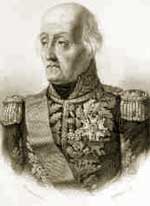Bon Adrien Jannot de Moncey

Fransk marskal.
- Saragossa II, 1808-09
Moncey enlisted in the army at age 15, to the despair of his father, a lawyer at the Besançon legislature. Made lieutenant in 1785, he continued his climb during the Revolution. In 1791, he became captain. Two years later he served in the Army of the Western Pyrenees, fighting the Spanish, and was soon named general. After occupying Navarre and the Basque country, he took Bilbao on July 19, 1795. He signed the Treaty of San Sebastien, which led to the Peace of Basel.
In 1797, after the 18-Fructidor, Moncey was denounced as a royalist and discharged. Recalled in 1799, he supported Bonaparte and took part in the coup d'état of 18-Brumaire. He was then named commander of a corps in Italy in 1800. In August, however, he refused to participate in the occupation of Italy under Murat. Bonaparte did not hold it against him and named him inspector general of the police; he kept this position until 1815.
Showered with honors at the advent of the Empire, Moncey was recalled in 1808 to Spain, where he took part in the sieges of Valencia and Saragossa. Although he received the title of Duc de Conegliano, he would no longer be given major commands.
He was still involved in war, however. On March 30, 1814 he was among those who ardently defended the Allies' entry into Paris. During the first Restoration, having shown his support of the new government, Moncey was named Peer of France by Louis XVIII and maintained his command. Napoleon, back from Elba, confirmed Moncey's peerage. Louis XVIII removed it upon his return to power.
Moncey, asked to preside at the trial of Marshal Ney, sent the King a letter justifying his refusal; the document caused a sensation. Louis XVIII dismissed him and ordered him imprisoned, but the Prussian commander of the fortress of Ham refused to jail the marshal. Proving himself to be a man of honor, Moncey voluntarily imprisoned himself, first in an inn, then in his château, certainly a much more comfortable jail.
The King returned his marshal's baton to him on July 3, 1816 and his peerage in 1819. He continued his military career. Present at the return of the Emperor's ashes in December 1840, he said after the ceremony, "Now, let's go home to die." He died on April 20, 1842.